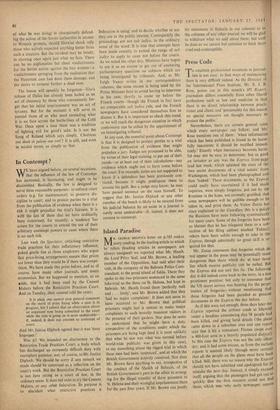Press Code
rro establish professional standards in journal- 1 ism is not easy; to find ways of maintaining them is very difficult indeed. As the Director of the International Press Institute, Mr. E. J. B. Rose, points out in this month's IPI Report, journalism differs essentially from other liberal professions such as law and medicine in that there is no direct relationship between practi- tioner and client, and 'presumably for this reason no special measures are thought necessary to protect the public.'
Nevertheless, there are certain general rules which every newspaper can follow; and Mr. Rose mentions one of them : 'when information which has been published is found to be harm- fully inaccurate it should be rectified immed- iately.' Exactly when inaccuracy becomes harm- ful may not be easy to determine; but as good an instance as any was the Express front-page lead last week, which splashed the story of the 'two secret documents of a vital nature' from Washington, which had been photographed and then 'leaked.' These documents, as the Express could easily have ascertained if it had made inquiries, were simply forgeries, put out by the Russians in the hope, not normally gratified, that some newspapers will be gullible enough to be taken in, and print them. As Victor Zorza has since explained in the Guardian, this is a policy the Russians have been following systematically for many years. Some of the forgeries have been so blatant that he has relegated them to a sub- section of his filing cabinet marked 'Falsies': others have been subtle enough to take in the Express, though admittedly no great skill is re- quired for that.
Mr. Zorza comments that forgeries which do not appear in the press may be potentially more dangerous than those which do; at least those lies which receive publicity can be nailed. But the Express did not nail this lie. The following day it did indeed come back to the story, in a less prominent position; but only to announce that the US secret service was hunting for the perpe- trators of forgeries—without mentioning that those forgeries had been paraded as genuine documents in the Express the day before.
As if this were not enough, three days later the Express reported the airliner crash at Idlewild under a headline announcing that 98 people had been killed, and giving lurid details ('the plane came down in a suburban area and one report says that it hit a restaurant. Flames swept over a 400-foot area in a heavily populated district). In this case the Express was not the only offen- der; and it had some excuse, as from the earliest reports it seemed likely (though never certain) that all the people on the plane must have been killed. Still, there was no reason why the Express should not have admitted and apologised for its mistake the next day. Instead, it simply excused itself, arguing that the passengers had got out so quickly that the first rescuers could not find them, which was 'why early newspaper reports suggested a heavy death roll.' Some newspaper reports had confined themselves to `suggestion': the Telegraph, for example, had been careful to say '98 believed dead.' But not the Express. lts headline had asserted, simply, `Airliner crashes-98 die.'











































 Previous page
Previous page